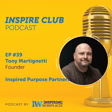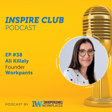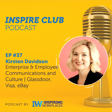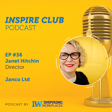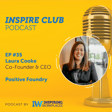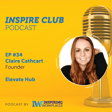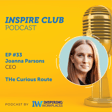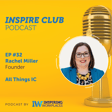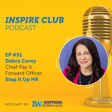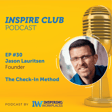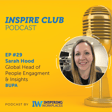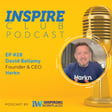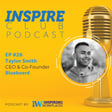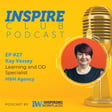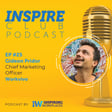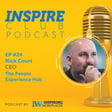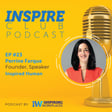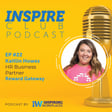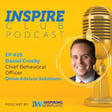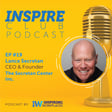Become a Creator today!Start creating today - Share your story with the world!
Start for free
00:00:00
00:00:01

Inspire Club EP #21 - Bobby Duffy
In this episode we talk with Bobby Duffy, Author of The Perils of Perception.
Bobby Duffy is Professor of Public Policy and Director of the Policy Institute. He has worked across most public policy areas in his career of 30 years in policy research and evaluation, including being seconded to the Prime Minister's Strategy Unit. Bobby sits on several advisory boards including Chairing both the Campaign for Social Science and the CLOSER Advisory Board, is a member of the Executive of the Academy of Social Sciences, a trustee of British Future and the Centre for Transforming Access and Student Outcomes in Higher Education (TASO) and a Senior Fellow of the Munk School of Global Affairs & Public Policy, University of Toronto.
We hope you enjoy it.
Recommended
Transcript
Introduction to Inspire Club
00:00:02
Speaker
Hello, hello, hi everybody and welcome to Inspire Club brought to you by Inspiring Workplaces.
00:00:17
Speaker
I'm Ruth Dance, I'm one half of the hosting team for Inspire Club and I am really, really excited about today's episode. Just like in the 1990s classic Fight Club, we only have one rule too. Our only rule though, is that each guest must share a story of one person who has inspired them along the way. Particularly in the world of work, we really want to put out positivity and maybe thank someone that didn't even know they'd inspired someone else in the world.
00:00:46
Speaker
Also, in each of our episodes, we do ask a guest to recommend someone that they think would be a great guest on Inspire Club.
Meet Bobby Duffy
00:00:54
Speaker
Way back when, in episode five of Inspire Club in 2020, Sonia Stocker, who is our guest then, recommended today's guest. And I'm so glad that we finally managed to track him down and he's a guest for today's Inspire Club. His name is Bobby Duffy. He wrote a book that Sonia read before we recorded the episode with her back last year. And that book's called Perils of Perception.
00:01:22
Speaker
She talked about how the book is around our perceptions lead us to believe something that we think is true but actually statistically and factually it really isn't. She said she'd love to hear more about Bobby's predictions for the workplace and also for the years ahead.
00:01:39
Speaker
Sonia also described Bobby as an academic but also a really inspirational person to listen to. There you go Bobby. Bobby is the Professor of Public Policy and the Director at the Policy Institute. He has worked across most public policy areas in his career of 25 years in policy research and evaluation.
00:01:59
Speaker
He has been seconded to the Prime Minister's Strategy Unit and the Centre for Analysis and Social Exclusion at the London School of Economics. I'm just about managed to get that mouthful out and hoping that Bobby might elaborate a bit more on that, particularly for people that are maybe not familiar with the policy institute and those that are outside of the UK.
Bobby's Books and Generational Insights
00:02:19
Speaker
His new book, yes, he's written a second book, and that is coming out next Thursday. It's called Generations. This book is going to be challenging the myths and stereotypes around generational trends and helping us to seek a greater understanding around generational challenges. It's certainly a subject that inspiring workplaces have talked about. We've worked on collaboration guides and e-books with our community. And even a couple of years ago, back when we could meet in person, we ran a dinner debate on that with some of our community as well.
00:02:49
Speaker
So before I carry on talking about generational challenges and books and everything, Bobby, welcome. Yeah, great to be here. Thank you. Lovely introduction. Well, Sonia helped with most of that introduction back in her previous episode. And congratulations on getting to nearly book launch and publication date. I can imagine in a lockdown situation that has not been easy.
00:03:13
Speaker
Yeah, it is one of those things that you feel quite differently because you're isolated from people. I remember the first book was quite exciting and you're getting ready for events and seeing crowds. I suppose it's like the gap is getting a reaction from an audience when you're talking to it. Doing virtual events is just so much harder because you can't
00:03:35
Speaker
You can't interact in the same way with people. And that's made it so clear how important it is to get people together, because it is a conversation. These, while it might feel like events are you talking and broadcasting, actually it's much more conversational than you realize until you have to do it to a screen on Zoom. And then you remember that you miss all this, the reactions from the crowd and all that type of stuff. It's crucial.
00:04:04
Speaker
Yeah. Yeah. We think we did so well, but actually we're getting to that point where we really need to be able to see people from the shoulders down and assess body language and be able to butt in and not have to take yourself off mute when you want to talk. That's right. All of that. Yeah. Yeah. Yeah. So, um, before we get started actually on our first rule of Inspire Club, um, do you want to share a little bit more about the book that's coming out next Thursday, um, outside of what I've said around generational challenges?
Debunking Generational Myths
00:04:34
Speaker
Yeah, I mean at heart the book is saying that generations and generational thinking, thinking about generations, is a really big idea that's, you can see it throughout sociology and philosophy as
00:04:50
Speaker
seen as one of the key drivers of how societies change and refresh. And, you know, you get very big philosophers like Auguste Comte or sociologists like Karl Mannheim, who see effectively generations as the most important aspect of human societal change.
00:05:11
Speaker
But sadly, we've taken that very big idea and we've kind of corrupted and lost it in a whole sea of nonsense about stereotypes and myths about how and why generations are different from each other. Exaggerated stereotypes and cliches.
00:05:31
Speaker
that we're just bombarded with daily about millennials or gen z being this or that, millennials killing this or killing that, baby boomers being sociopaths and there's literally books written about how baby boomers are a sociopathic generation and we kind of lost the
00:05:48
Speaker
we've lost the real essence of what this is, which is about understanding who we are and how we're changing as a society overall. So that's the goal of the book, is to separate those myths, which there are a lot of. And to be honest, workplace-based research and consultancy is one of the drivers of it quite often. Marketing research is the biggest driver, but then workplace-based research is sometimes awful on this, sometimes great, but more often than not, very bad at exaggerating differences.
00:06:19
Speaker
And separate that from what is underlying that there's some really important changes where the generations are different and stay different as they get old. Fundamentally, there's one little tool in the book, which I use, I've used for decades now, which is effectively when you look at societies or individuals and how they're changing, there's only three effects that explain all change.
00:06:43
Speaker
One is a cohort effect, which is one generation is different from another and stays different. One is a life cycle effect, which is that people change as they get older, as they go through different life stages in a fairly predictable way.
00:07:00
Speaker
A very powerful effect is often left out. So a lot of the myths are to do with just young people, that things that are claimed to be different for Gen Z or Millennials are actually just a reflection of youth, nothing else really. And then the final effect is period effect, where something happens, it changes things for everyone. So the pandemic is the classic period effect where we've all been affected by it in some way.
00:07:29
Speaker
And one of the just so very simple tips and tricks is whenever you're seeing a change, just trying to work out in your own head, is this a cohort life cycle or period effect? Is it really, really useful to try to understand? Is this a change that's going to stick for the long term? Or is it just a reflection of a repeated pattern that we see throughout history? And don't worry about it so much.
00:07:56
Speaker
That's what the book tries to do, it tries to apply that sort of framework to understand what's really changing.
00:08:02
Speaker
That sounds really, really helpful. Instead of, like you said, watching a five-part PowerPoint presentation where we've just put people into boxes based on their date of birth and completely stopped at that point and said, this is all the things about these people. And if you have people that work in your team that are in this age bracket, expect them to be like this, doesn't really work. It's really, really helpful to think about those three things. I think about my own children and I think, well,
00:08:32
Speaker
How am I ever going to be able to relate to them? We didn't have mobile phones when I was younger. We definitely didn't have social media or anything like that when I was growing up. How am I going to be able to relate to them? But the reality is that maybe when they have children, I'll be able to relate to that part of that life cycle and be able to relate to certain stages.
Personal Inspirations and Career Reflections
00:08:51
Speaker
It's really, really interesting. My children will never know that life's like
00:08:55
Speaker
um not to wear masks and not pre-pandemic they'll never remember that like um two my twins were born a couple of months before the pandemic started probably actually during the pandemic so um yeah it sounds sounds super interesting i can't wait to get my hands on a copy and
00:09:14
Speaker
just over a week. Really, really interesting. Let's get into my first rule of inspire before I forget to follow my own rules. Could you share a story with us about someone that has inspired you along the way and why? Yeah, that's, I'd love to. It was an early line manager
00:09:39
Speaker
of mine who then went on to be like director of the division and then managing director and then went off into a global role because he you know he's very talented leader I guess and I think the the story that I remember the most and this is
00:09:57
Speaker
it's for different sorts of reasons is that he actually had like a map of his career because he was quite junior when I when he was my line manager because I'd just come in so he was only two or three years ahead of me in that but he had he'd mapped out his career in a kind of bubble diagram
00:10:20
Speaker
that related his strengths to the different types of roles that he could do and then how that would help him towards his end point and I'd never seen or heard anyone do that when he was must have been he was a little bit older but he wasn't that much older
00:10:40
Speaker
and it must have been in mid-20s I guess and having that sort of thinking of planning ahead was just completely new to me as someone relatively new out with uni just winging it and it was really quite it was inspiring and not in the sense of God
00:11:02
Speaker
that's what everyone should be doing, that type of detailed career planning, but just that sort of writing it down, thinking it through an honest view of your own strengths and weaknesses or things that you need to
00:11:21
Speaker
to put in place was really, really interesting. And it didn't, it's not to say that it massively changed me and my still quite happenstance view of things that things just happened to some degree. But it was just really, it was really great to see someone doing that and thinking about themselves as a project, I guess, I suppose that was we're all project managers of particular things.
00:11:49
Speaker
And it is the way you would approach an evaluation or a project or the sorts of things that I do in my day job. And that was really good. And it wasn't like, the reason it was inspiring wasn't like didactic about it, everyone should be doing this or this is the way to do it, but it was just a different way of thinking.
00:12:08
Speaker
Yeah, I like that. I like how you put thinking of yourself as a project. And we don't, we often don't even really think about ourselves, maybe about what we're going to eat and what we're going to wear or where we're going to go on holiday or what we're going to do, but not really thinking about our lives and our careers as a project as such. So that's really, really interesting. I like to say so early on in your career where you're probably keen to
00:12:34
Speaker
please and work hard and just get through each month, let's say, not really thinking about long-term, especially not in them bubble diagrams. Wow, that's really interesting. Are you still in contact with this line manager? Yeah, he's intermittently, but yeah, he's gone off to do different sorts of things. So he didn't end up following his exact career path, I wouldn't say, to compare it with my memory of it. But I think it was that point of,
00:13:00
Speaker
We put so much effort into our day jobs. And we have very detailed approaches to project management and methodologies and all sorts of other things that you can apply to that. And you do not apply a fraction of that thinking to what it is that you want to do, not even a tiny fraction of that amount that I would do daily on my day job on individual projects I will forget about in the next few months.
00:13:30
Speaker
Whereas your own career, it just sort of happens to you. And that's a thing worth questioning without getting too obsessed by it, but it's a thing worth questioning.
00:13:45
Speaker
Yeah, is our career just happening to us or can we have somewhat of control over it? Can we control it and can we project manage it ourselves? Yeah, really, really interesting. Thanks for sharing that, Bobby. Bobby, we ask a lot of our community to share this subject with us, which is,
00:14:06
Speaker
What is your why? What gets you out of bed in the morning? What's driven you to be so successful and write books? What gets you out of bed? I'll stop there. What is your why?
00:14:21
Speaker
I've got an enormous subject matter of interest in what I do, I suppose. So I feel in many ways what I get to do is a bit of a privilege, not so much a chore because in terms of the subject that I...
00:14:36
Speaker
the subjects that I look at I get it's one of those ones where you know sometimes you get a little bit of I can't believe they pay me to do this sort of stuff because I'm just interested in it anyway so it's that I got a really real real interest in
00:14:52
Speaker
a geeky interest in the sorts of things that I get to study or research or evaluate or talk about. So there is that element. I mean, obviously, you know, a lot of the day job is the messiness of workplace and running. Those types of units is like everywhere. There's always challenges that are
00:15:17
Speaker
much more messy and less satisfying. But the fundamental of being able to, in my case, understand public opinion and behavior and research that in a fairly free and open way is more of a privilege. And it sort of goes Policy Institute at King's is similar sort of thing where we get to shape our own agenda a fair bit and then incredible privilege of having
00:15:45
Speaker
a neutral convening space like King's College London and all of the great stuff that comes around for being in a university of people wanting to engage with you. That is a privilege. So the thing that I suppose is the why a little bit is making the best use of that.
00:16:05
Speaker
and I can because it's something that shouldn't be taken for granted that you can do this. So it's not about just pursuing your own interests. You should be looking at stuff that's important or will make a difference and make the world a better place in the end, which is King's objective.
00:16:27
Speaker
And we're a very small part of that, but it is part of that idea that the things that we can do can actually improve things. Yeah, making the world a better place, improving the world, and enjoying and having, as you said, a geeky interest in what I do. That's amazing. Sometimes when people say to me, I don't do what I do to then
00:16:57
Speaker
go out and do the things I love on weekends. Like I love what I do every day. Like I'm just, can't believe I'm getting paid to do this. That's a pretty good like purpose generated to get you out of bed and to get you working every day. That's amazing.
00:17:11
Speaker
Yeah, that is good. I'm not saying that's what it's like every day. And there isn't, there isn't loads of rubbish that you have to deal with or whatever else, but there is, um, but fundamentally, yes, that's, uh, having that, that sense that it is, it is, you take pleasure in big chunks of it is really, really important. What's the best experience that you've ever had in your working life? Yeah, it's an interesting one, that one I was sort of, um,
00:17:41
Speaker
You've had lots of highs of, you know, ones off, one off things where you've, I don't know, you've engaged with someone very important or, um, uh, and, and changed, you know, helps to change some different things. But I think, I mean, the one that when I was looking at that question, it was, I used to do political polling, Ipsos, Maury. Um, and we did, I oversaw the general elections, um, polling, which was always like,
00:18:10
Speaker
an incredibly frenetic period in the run-up to a general election. We would do prediction polling for the media and others. And that, it was those, and sometimes they went well, and we were good and close to the result, and sometimes they didn't go so well. I wouldn't really pick out one that went really well.
00:18:36
Speaker
It was more the overall experience of that. I suppose it is the experience of that. Everyone is looking at that with a huge interest in it. We're, again, a very small part of it. It's going to affect the next X years. And you are trying your best, mutually, to get an idea of what's happening and what's going to happen. And you have no time to do it in
00:19:06
Speaker
it's very, you know, you work through the night and it seems easy from the outside or it seems straight, you know, it can be easy but it seems like.
00:19:14
Speaker
pretty straightforward process from the outside, but there's a lot more to it when you're working on it. So you've got a team that is working flat out until disappears into a bubble to do this type of work. And then comes out the other end, either as heroes of getting it right or as villains of getting it wrong. And you can't really tell, but the
00:19:38
Speaker
Anyway, whichever way it goes, they're sort of intense experiences, I guess, and they're the ones that stand out when you look back. There's a lot of philosophy and sociology on this.
00:19:49
Speaker
I'm never going to look at polling on my TV in the comfort of my own home in quite the same way again now. Like you say, I just think that they've just kind of like got some data from online or polled some people and brought them all together. But now I know that there are teams of people who are highly caffeinated that are working in bubbles across the country or across the world, I guess it must be the same in.
00:20:13
Speaker
in all parts of the world whenever they have elections, re-elections or however they go about managing their countries. And like you said, that is then affecting people's lives, potentially for the rest of their lives, depending on what stage they're at in their lives. So links quite nicely into your book as well, I'm sure. Wow, that's really, really interesting. What do you think is a major priority right now in the world of work?
Impact of Covid on Work Culture
00:20:44
Speaker
Well, I mean, it's Covid. I'm afraid you can't get away from that. I was just talking to our principal at King's before this about the extent to which, you know, again, being a major employer in London,
00:21:06
Speaker
as King's College is and being a key part of the city more generally and having that convening power that we really want to have a focus on the changing workplace in light of COVID and pull some things, research and great thinking together and events and everything else around this because it's just
00:21:35
Speaker
Well, you and your audience will know this really well, but the implications from this or the changing nature of work and workplaces
00:21:47
Speaker
is going to be huge and not a blip and have all sorts of endless repercussions on how places work and cities work and how society works more generally. We did a series of studies last year on
00:22:07
Speaker
life under lockdown, we called it, partly with the BBC and with others too, which looked at people's changing. And at the end of that, there was a little segmentation study into how people were feeling about coming back. And it was, you know, three groups of people. There was
00:22:31
Speaker
the keen, keen to get back, get on with life. There was the concerned who were still really worried about how this, how it's going to be working, how it's going to be safe for people and the content who are pretty content with this new form of life of
00:22:51
Speaker
staying at home and the interesting thing about that was it was no demographic predictor of that. It wasn't cut across age groups and genders and social classes, it wasn't predictable on the basis of
00:23:04
Speaker
young versus old or men versus women or better off versus worse off. It was like where people popped up in those types of groups was quite unpredictable. So there's a lot more to this than it's going to be quite unpredictable.
00:23:22
Speaker
Yeah, absolutely. We're hearing of organizations that are losing really, really good talent right now because they may be sitting in the comfort group and maybe they didn't predict that they would sit in that comfort group or they assumed that they wouldn't. They do not want to come back into an office or commute for four hours a day or
00:23:47
Speaker
whatever and they are very highly productive in what they're doing and working at home and they're losing this talent now because they're not supportive enough or not adapting their strategy and how they operate as a business because of that. Lots of challenges. I'm hearing human resources departments
00:24:12
Speaker
people departments have got their work cut out from a policy perspective as well and how they do that in the back end. I was even hearing recently around people that want to be able to work from anywhere, that's great and they're super productive, but if they want to go and work
00:24:30
Speaker
in a different country for a month, the tax implications that come with that etc etc so there's there's a lot of stuff going on in the back end as well isn't there it's going to take a long time rather than just giving people a choice and seeing what happens.
00:24:44
Speaker
Yeah, I just, I think it's, yes, it's, it's like, yeah, I think like lots of the pandemic stuff, we thought it, you can see how opinion has changed over time rather being a blip to, yeah, it lasts for a little while. And then lasts for a long time. And then, you know, increasingly, these aspects that you think aren't going to be changed for
00:25:07
Speaker
the very long term, if not forever. So, yeah, I don't really, it's clearly the biggest challenge that we're all interacting with both directly as employers, but then more from our policy and student point of view and Kingsborough view from a public policy and city policy and everything else point of view, it touches everything. Bobby, it sounds like you really enjoy what you do because you have such a keen interest in everything that you get to do.
00:25:35
Speaker
But if, I said to you, you're going to have to swap jobs to someone for a day, is there anyone that you would swap jobs with and why?
Leadership and Productivity Tips
00:25:43
Speaker
That's a really good question. So the other thing, because I thought about this again, because it was quite often, I often draw parallels with how things are going in corporate world and then football teams. And I would really love, I'm a fan of a particular club, but it doesn't really matter to me. I'd really like to see
00:26:05
Speaker
what a football manager at like a top level one, I mean, like Premier League or top league in any country really has to do day to day. That's fascinating. You see some brilliant leaders as football managers around the world again, and they're really inspiring.
00:26:24
Speaker
people, but the blend of things that they have to do is a complete mystery to me. I maybe should read more biographies of something from them, but it is because they have to deal with so many different things beyond the direct product on the pitch. And I'm just fascinated by that, how they get that balance right. And it's just a mystery to me about
00:26:50
Speaker
What do they spend their day doing? I would love to know the extent to which it's sponsors and internal management stuff versus just that inspiring role. I expect it's iceberg-like in what we think, I don't know, Jurgen Klopp.
00:27:08
Speaker
or Pep Guardiola does day-to-day is that sort of talking to the media, inspiring the team and that type of stuff is nothing like what they have to do. I don't be really interesting to know as an archetype of where leader inspiration seems to be central to performance, how that actually fits into their
00:27:35
Speaker
what they have to do. What they do, what they do, yeah. What we see, like you say, on the TV or on the pitch, just the tip of the iceberg and the reality. Yeah, how interesting. I mean, I'm not really a...
00:27:48
Speaker
huge football follower, but you've made me want to go and shadow a football manager for a day now as well. And just see what really goes on behind the scenes. Like, are they really at the stadium the whole time? Like, that's what I always assumed. They're just on the pitch, although at the training ground. But like you say, the reality is like, are they having performance conversations? Are they negotiating like sponsorship deals? And what do they do? That's them.
00:28:11
Speaker
That's really interesting. If we have anyone that knows any leadership in football that's willing to let Bobby come and shadow them for a day, then do let us know. And Bobby, I'll put you in touch and maybe I'll come along just for the fun of it for the day as well. And we can report back. Yeah. Only if it's Arsenal, to be honest, I don't really want to go to. Okay. Okay. Now, now we're getting, now we're getting faster. Yeah. Um,
00:28:37
Speaker
You juggle an awful lot of things, Bobby, and you, I always have, we've heard some of that, not only are you authoring books, but you're working on research and policy and leading and everything else. How do you stay productive? Do you buy any tactics? Yeah, I mean, I don't know that I am massively productive. I'm sort of, I do, I have a, yeah, I have a,
00:29:05
Speaker
a long concentration span, I suppose, that I can just do stuff for a long time. So the book I did 14-hour days on, for example, let me just do it. And I think the
00:29:20
Speaker
but the product is sort of tip or trick or anything. The only thing that I can think of and it's not very inspiring and special as a tip is just start. I mean, I find that myself as I, for variations, obviously the.
00:29:35
Speaker
the greatest risk in lots of these things but even, and I do a lot of writing or presentations or those types of things and it is just starting and the book writing is the same, you just write because you know you're going to have to rewrite
00:29:53
Speaker
in any case because you always get something from that first draft or even first sketch of thoughts so you literally get something or anything down or very much that rather than a planner um where you would sketch out the whole story
00:30:13
Speaker
from beginning to end. I'm not sure that's a good tip for people. Maybe it is much more efficient to do that sketching out, but I always find that it's more of a journey of finding bits as you go along for me rather than having a complete map. Yeah, I guess everyone's got their own learning styles, personality styles,
00:30:38
Speaker
I would procrastinate the sketching out stage for years. If someone asked me to write a plan before I started working on something, that plan just would never come to fruition. I just would never get that plan off the ground. But if someone asked me to just start it and see what happens and learn along the way, I'd get in there straight away. So quite similar to you in that respect.
00:31:00
Speaker
Just get a few words on paper or just eat the frog is the terminology to be procrastination. Just eat that frog and just get started. Stop letting it grip it in your ear. But yeah, so anyone that's like Bobby and I and still hasn't got that plan off the ground, then maybe just get started on what you've been planning on doing. Just get started today. Report back, how did it go? You talked a little bit about
00:31:30
Speaker
just getting started then and learning along the way. Is there anything that you are learning at the moment, either through the process of work or something that you're going out of your way to further yourself
Learning from Publishing
00:31:43
Speaker
in? That's a good question. I mean, I suppose mine ends up being quite subject.
00:31:49
Speaker
driven rather than skills-based, because that's the nature of the job, I suppose. So I mean, the thing that I've learned a little bit about, I've only done this in my second book, but the thing that you've learned about from the book is that you learn so much more about the subject after you've written it, which is quite frustrating in some ways, because you wish you'd put it in the book. So I'm still learning about generations, because people come to you once you've got a book on it.
00:32:19
Speaker
on a subject and tell you other stuff that you should already have known. You should play in the book. Yeah so that's, I'm still learning that and like loads of good stuff about what we learn in other countries. The book is actually, the book's coming out in the US as well at the end of October so I'm having
00:32:40
Speaker
more of a focus on that the US context for this and that's been great in understanding that because it's got a longer history of talking about generations in the US quite so much. Actually they're calling it the generational myth in the US rather than generations because that sort of shows how much further they sort of sick of generational
00:33:06
Speaker
thinking there and are quite ready to question it, I suppose. So I'm still learning that, and that's great, I think. I mean, it was the same with the Misperceptions book. It learnt so much after.
00:33:19
Speaker
it about why we're wrong about things. So yeah, so they're very much a process, I suppose, not an end point. Again, is what you learn. And that's good. That's good for me because it just all helps with the broader understanding of society and change. Yeah, it's really interesting when you talk about, I wrote a book
00:33:44
Speaker
People then come to you for all the knowledge around that book, but once the book's gone out and it's been printed or you're still learning more, there's still more that you can add. You can keep adding chapters onto the end or you can keep amending it. And I guess that's the point of volume two and reiterations in volume three.
00:34:03
Speaker
Yeah, I mean, it is not even the book itself, you wouldn't know the book is done and maybe updated, but it's more the sort of life learning from it, I think, and the discussions you get into with people. And yeah, the generational one is, you know, what is a lot more about what do we actually do to provide a better future for next generation, and then you start to get into what are the policy or practice things that you can do to get back that bit of faith, we've lost a lot of faith that the future is going to be better for
00:34:32
Speaker
the next generation and it's that type of thing that you move on to actually, so what do you do now?
00:34:40
Speaker
Yeah, that's really interesting. As our listeners know, I have twins that are one and a five-year-old, and I often hear of other friends that have children similar age being like, I'm scared about the world my children are gonna grow up in, or I don't know about the world my children are gonna grow up in, or I'm really worried about their future. The reality is that we could do some more learning and research around this, and we could actually help shape that future for them, and we could actually be a part of that rather than just sitting back and watching and being scared, right?
00:35:08
Speaker
Yeah, well, exactly. I mean, that's one of the... I don't want to talk too much about it.
00:35:13
Speaker
book. I haven't read it just. Yeah, but I mean, that's exactly right. Is it one of the one of the most damaging aspects of some of the bad generational thinking is that it makes it feel like we've got no agency, that there's different types of generations, characteristics, and you're set with that characteristic of, you know, millennials are narcissistic snowflakes and baby boomers are sociopaths or whatever those. And then you go towards and then you've got to
00:35:42
Speaker
then people have used it in the US including, you know, important people like Steve Bannon.
00:35:48
Speaker
who advised Donald Trump and all of those have used it as a way of saying that crisis is inevitable. We've got this crisis coming up because we've got this combination of generations coming up, which will lead to conflict. And the trouble with that is it just does give this sense. There's nothing you can do when you take the longer term view of how generations have changed in the public.
00:36:17
Speaker
behavior and attitudes have changed over time. You see that there's always ups and downs in these things going back to the 70s, faith in democracy or trust in other people. And it isn't inevitable decline. And society can improve and change and adapt to all sorts of challenges. Because we can see it in the history of this. And that is one of the real risks of the bad generational thinking is that it's all set
00:36:47
Speaker
that you've got these vast swathes of the population of this particular character or going in this particular direction and there's nothing we can do to change that. And that's horrible to take away agency from people because it actually gives us an excuse not to do anything when actually there's lots we could
The Dangers of Stereotypes
00:37:04
Speaker
do. Absolutely, it's dangerous thinking. It's like saying, well, climate change is happening and there's nothing we can do. It's just dangerous, right? Okay, I'm going to
00:37:16
Speaker
Pick up the pace for our quick-fire round. Are you ready? Yes. Oh, right. I didn't realize it was a quick-fire round. Good. Right, then. So quick-fire round. If you were a teacher, what would you teach? Oh, see, I'd love to do the misperceptions course. That would be great. Do that in schools. Tell kids why we get these types of basic things wrong, because there's some tips and tricks you can do to try to get a better understanding of the world. That would be a great thing to do.
00:37:43
Speaker
Sounds amazing. I'm definitely starting young in schools as well. Get it in early before things are too ingrained in us. Yeah, that sounds amazing. Are you an early bird or a night owl? Very much at night owl, even with kids. My kids are older now so I can get away with being more of a night owl again.
00:38:03
Speaker
Yeah, they're not up at 4.35 in the morning like mine then. I'm sorry about it. I feel sorry for you. Yes. We share, we have a playlist on Spotify and other musical streaming platforms, which is the Inspire playlist. And it is all of the songs that fire up all of our guests in our community around the world. Is there a particular song that you love?
00:38:31
Speaker
Oh wow, so many. I'm a big music geek. That's such a good and difficult question. There's a band called Los Campesinos who are
00:38:48
Speaker
just an indie pop band in who are getting quite old now, but they are very lively. So it'd be a thing called Sweet Dreams, Sweet Cheats, which gives you an idea of... I've got it. I found it. But that's how they finish off their gigs when they're doing live music. And I miss those sorts of gig things. So we play that to the kids, and the kids know all the words, even though they hate that sort of music. They jump around to that.
00:39:18
Speaker
Yep. It's called Sweet Dreams, Sweet Cheeks by Los Campesinos. I found it and we are going to add that to our playlist. That was released in 2008. Oh yeah. That's quite a while ago now. I'm very old.
00:39:32
Speaker
You don't look old. Okay, we're going to add that one and we will get listening to that as a team later on. What about around the house? Are you hands on around the house or are you hope that no one saw that, leave it to someone else? Yeah, definitely the latter. Yeah. Yeah, you've got quite a messy house, but none of us are particularly on top of that sort of stuff.
00:39:59
Speaker
Well, it's good you admit it. You know what, probably most guests on the podcast say, no, no, I definitely hands on around the house. No, no, we were, but yeah, it's a family trait, I think, rather than... It's not just me, it's all of us. It's not just me, it's all of us, yeah. It's the entire Duffy household. Have you got a favourite film?
00:40:20
Speaker
Oh, that's, I mean, it's a wonderful life. I do really, really like, and I know it's such a cliche, but I could talk about it in the book because it's actually, it's very useful framework for thinking about.
00:40:37
Speaker
what impact we have on the world. And in this incredibly dark film that is somehow being transformed into a Christmas, you know, feel good film, but it's actually Frank Capra, very dark.
00:40:55
Speaker
treatment of lots of the things. Obviously it's got quite a lovely schmaltzy ending, but the actual, when you look at the content of the film, there's quite some horrible themes in there. So I do like that as a film and it's actually, yeah, I use it in the final chapter of the book to try to illustrate how we can understand our impact on the world. Yeah. It's a wonderful life.
00:41:23
Speaker
Get out, it's nearly Christmas, right? We'll be showing that in household. I know travel's been off the cards for a while now for many of us, but is there anywhere in the world that you've visited that really stays with you? Yeah, we got really lucky once and had a conference in Los Angeles and then a partner came out and
00:41:49
Speaker
We went to Hawaii, Kauai in Hawaii, and it was, we thought it was just off the coast, we were so ignorant. This was a long time ago, we thought it was just off the coast of the US, when it's actually, obviously in the middle of the Pacific, so we had this other eight hour, nine hour flight into it, and we got, you know, it was a real disaster from sort of planning.
00:42:08
Speaker
point of view because it may have knocked everything out but but most amazing place i don't think i'll ever get back there it was only really expensive and difficult to get to particularly with kids but it was incredible it's just like it's it's like you see in the movies but even better
00:42:26
Speaker
We have members of our community and listeners. They are based in Hawaii, which is amazing. We've had them join our workshops recently and as you'd predict, they say, Aloha from Hawaii. Yeah, they're very lucky. It's an incredibly beautiful place. Yeah, one of our colleagues in Amy who works in the Inspiring Workplaces team, she's been there.
00:42:51
Speaker
It's definitely on my list, but maybe not right now. Maybe not with the kids right now. Okay, my final question for our chat today is, you came through to us by being recommended from a previous guest.
Future Guest Recommendation
00:43:09
Speaker
Who would you recommend as someone to see on a future episode of the Inspire Club podcast? Yeah, so I...
00:43:17
Speaker
When you were talking about authenticity, there's a colleague or there's a visiting professor of ours called Alice Sherwood, who's writing a book on authenticity. What does it actually mean? I did wonder whether, because not unlike generations, authenticity is one of those words that is used and misused in both marketing
00:43:44
Speaker
thinking and in workplace based thinking that is, but also is very valuable if you think about it in the right way. So I did wonder whether I think Alice's books out in March, no wonder whether it's having a discussion about what she's learned about what, what does authenticity actually mean to people and how is it useful as a concept could be a really interesting discussion for you and your audience.
00:44:08
Speaker
Yeah, absolutely. It's certainly a subject that comes up a lot, particularly when we talk around leadership and when we talk around communication. And there are two subjects right now that being truly authentic in how we lead and how we communicate and really truly authentic is what's making a real difference, particularly with this post-COVID or the new way, I shouldn't even say post-COVID, we're still in it, right? Like just this kind of new way of living now and
00:44:38
Speaker
breathing and being and being completely and truly authentic with one another is what's gonna be really key. So Alice Sherwood, we will give her a hunt. We'll contact her just like we did you, Bobbie, and I'll say that you recommended her and I'd love to learn more about her book as well. So if anyone wants to get hold of your book, your new one on Generations, where can they get a hold of it, Bobbie?
00:45:07
Speaker
Oh, hopefully. I mean, I know it's a global audience for you also, but it is on Amazon. But if you've got other local sellers that you prefer, then it should be on those too. Like, say, the US version has got a slightly different take. It's the same content, but that's out on the 26th of October, if there's any.
00:45:27
Speaker
but you can get the UK version, which is the same in terms of the argument and the data. The book is international, deliberately trying to look across countries, not just UK or not just UK and US. It's got lots from Europe and elsewhere too, in terms of the data that I look at, because I think I mean like that.
00:45:47
Speaker
The same reason you've got an international audience is we're all grappling with similar sorts of things around this. So I tried to look across countries as well. All the way to Hawaii and back and around the world, we are all going through similar. We're in different boats, but we're all going through similar stormy waters in how we're approaching things at the moment. So thank you. So I'm looking forward to getting my hands on a copy.
00:46:17
Speaker
in particular, I'm also going to make sure that I don't sit back and watch things happen, but play a part in what that future looks like for my children and for future generations.
00:46:29
Speaker
I'm going to take a listen to Sweet Dreams, Sweet Cheeks by Los Angeles. I'm also going to hunt Alice to see if she would like to be a guest on Inspire Club and talk to us about authenticity, a real big subject and words coming up a lot for us. And if any football managers are listening and would be willing for Bobby to come and shadow them for a day, then no, but not from Arsenal, right?
00:46:53
Speaker
No, from Arsenal. From Arsenal. We've got to make sure, yes, definitely Arsenal. Just the Arsenal manager, OK? Just the Arsenal manager, yeah. If Nicola Otheta is a listener, that would be great. OK. Bobby, it's been so great to talk to you today, and I'll make sure that Sonia, who recommended you, is one of your first listeners to this episode as soon as it's live. I've really enjoyed it, and I've found it super interesting.
00:47:16
Speaker
All the best for next Thursday with book launch. Thank you very much. And it's not easy without having a party and people in a room, but good luck with everything. And yeah, thank you again from all of us at Inspiring Workplaces. No problem. Thank you, Rachel. Really enjoyed it.
